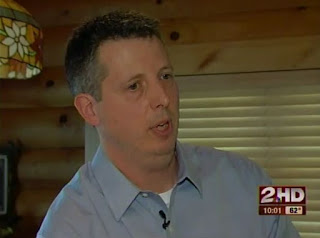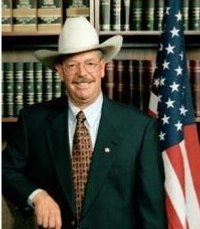Tuesday, May 22, 2012
The Rape of Delaware County, Oklahoma

In response to the audit, David E. Jones, the bar-certified sophist retained as Bernice’s town attorney, weaved a seamless web of persiflage, insisting that even though the cabal that employs him “did not follow the strict technical requires for publication [of the traffic ordinance], the public clearly had constructive notice of the existence of the Bernice Penal Code….”
Jones’s claim, rendered in less opaque language, was that the town’s status as a well-known speed trap constituted legal “notice” of the practice. Buttressed with this spurious and self-serving assessment, the town’s trustees voted on May 14 not to grant refunds to victims of the illegal ticket scheme, thereby laying permanent claim to more than $100,000 in illegally collected revenue.
Like nearly all official business conducted in Bernice, the May 14 vote took place in a meeting that was closed to the public, a practice typical of the cabal’s serial violations of the Open Meeting Act. The audit described habitual violations of that statute, each of which is a crime punishable by a year in the county jail and a fine of up to $500.
Until recently, the Town Board – which conducts nearly all significant business in “executive session” – had forbidden citizens to participate in monthly town meetings. Subsequent to the audit, that policy was modified to permit three minutes to citizens who wish to speak, which is not to say that the Board will allow anything that is said to have any measurable effect on its decisions.

“The atmosphere in a Town Board Meeting is meant to intimidate and silence people,” commented Bernice resident Steve Miller, who lives with his 72-year-old mother in Bernice, in an interview with Pro Libertate. “When you go to a town meeting in Grove, which isn’t far from here, there are no policemen, no security cameras. There is a U.S. flag, an Oklahoma State Flag, microphones set up for each Council member and for the citizens who wish to participate. Here in Bernice, however, there are always armed and uniformed officers present, security cameras – and no mike for public comments. It’s like going into a jail – or walking into a den of thieves.”
Miller, a consulting engineer by profession, is the civic-minded resident whose petition drive resulted in the state audit. His involvement grew out of the harassment suffered by his mother, Mary Zapf.
Starting in May 2010, Miller and his mother noticed that Delaware County Sheriff’s Deputies “began patrolling our property daily,” Miller recalled to Pro Libertate. “Our property is surrounded by three public streets, and I saw these deputies slowly driving by constantly. I started taking their pictures and even got one of them to talk to me briefly. I asked him why they were keeping our property under surveillance; his reply was, `Because the mayor told me to.’”
With Miller’s help, Mrs. Zapf was doing some construction and renovation on their property. This included modifying a driveway that had been used as a short-cut by motorists seeking to avoid a nearby intersection.
On May 4 of that year, Mayor Bill Raven visited Zapf to tell her that there was an unspecified “problem” with her landscaping project, and to ask her to “hold off until the town could get some things together.” Mrs. Zapf offered to have the mayor discuss the renovation with the contractor, who was on-site; Raven declined that invitation, insisting that he didn’t want to start a “fight.”
The following day, Raven and the Town Board decided to take “emergency” action to deal with supposed “zoning violations” on Zapf’s property. That matter, in typical fashion, was discussed in “executive session” during the May 10 Board Meeting. When it emerged from its secretive huddle the Board informed Zapf that no action would be taken, because she had agreed to “hold off” on further construction.
After waiting for nearly a month to hear from the mayor and the board, Mrs. Zapf sent them a letter announcing that she intended to resume work on her property. The improvements were finished on June 4th. Five days later, the Town Board sued her for “trespassing” by allowing alterations on her own driveway.
“The material basis of their claim was that they had an easement on the driveway because at some unspecified point in the past they had plowed it during the wintertime,” Miller observes. “We went through one of the biggest snowstorms in Oklahoma history a few years ago, and they never sent a plow.”
Shortly after being informed of the town’s lawsuit against her, Mrs. Zapf visited the town clerk’s office to request the agendas for the upcoming meetings of the Bernice trustees and the Zoning Board – matters in which she had an obvious and urgent interest. Town Clerk Connie King, ever the dutiful public servant, reacted to this eminently reasonable request by slamming the door in Mrs. Zapf’s face. That prompted the long-suffering widow to exclaim that the clerk was being a “stupid witch” – an epithet several orders of magnitude milder than what might normally be employed in a situation of that kind.
On the basis of that remark, Mrs. Zapf received a citation on July 20 for “disturbing the peace.” Although the only “witness” to Zapf’s supposed offense was the officious personage on the other side the door she had slammed, a police report was filed – two months after the incident – by two deputies who were not present when it occurred. The fine listed on the summons was $195 – an amount well in excess of the $85 prescribed in the fine and bond schedule.
“I knew the trespass lawsuit was a malicious attempt by the mayor to seize land, as there were no town residents … listed as plaintiffs,” Miller explained in his letter to the state auditor. “The harassment by the deputy sheriffs was an abuse of power by the mayor, and an attempt to intimidate and coerce my mother into a submissive position. The disturbing the peace accusation was false and intended to scare her away from obtaining public records. The police summons was another attempt by the town to intimidate a citizen. The fine was not only unfounded, it seemed excessive, so I began my own investigation.”
With the analytical discipline of a trained engineer, Miller examined the city’s penal codes and Delaware County Records to find out if this grotesque over-charge was a vindictive anomaly, or part of a larger pattern. What he discovered – and the independent state audit confirmed – was that the town had been in violation of state statutes “for approximately 25 years.”

Publication of the audit was greeted by the Bernice Town Board with what one participant in a rare public meeting described as “smirks and laughs.” By that time, however, the Delaware County Commission had cancelled its contract to provide deputy sheriffs for traffic enforcement. This was done not because of developments in Bernice, but rather because of “potential liability issues” arising from a $13.5 million settlement reached with victims of sexual abuse by deputies in the County Jail.
Complaints from female inmates at the Delaware County Jail began to accumulate in March 2008, many of them involving a part-time transport deputy named Bill Sanders, Sr. Sanders, recalled the Tulsa World, “would often take female inmates to `appointments’ without reporting his departing mileage and time…. It was during many of these transports that inmates say they were assaulted by Sanders and forced to perform sex acts.”
Key elements of the accusations were confirmed by a former county dispatcher, who also described how the former jail administrator, Lonnie Hunter, would “shake boxes of cigarettes at the inmates to encourage them to flash their breasts at him.” (Two dispatchers eventually filed sexual harassment lawsuits of their own.) Some of the inmates testified that both Sanders and Hunter would exchange cigarettes and other coveted goods for sex. When confronted with a particularly intransigent inmate, Sanders would simply assault her in the serene confidence that he would never be held accountable.
“Now you said you wouldn’t tell, and even if you did nobody would believe you, because you’re just a drug addict,” he told one victim during a trip to the emergency room. “Who are you compared to me?”
Sanders – who died at age 63 of “natural causes” in November 2008, just after being fired and just before the lawsuit was filed – was a part-time deputy who had no formal training and no personnel file on record. When deposed for the lawsuit, Hunter, Sanders’s supervisor, insisted that he was not responsible for the crimes committed against helpless inmates: “My responsibility is to the last locked door. After that, it’s up to the transport officer.”
 |
| Former Sheriff Blackfox. |
The OSBI gave Sheriff Jay Blackfox a detailed report describing the sexual abuse suffered by more than a dozen women by staff under his authority. In his deposition, Sheriff Blackfox insisted that he wasn’t “aware” of what was happening in his jail, because he had only read “part” of the OSBI’s report owing to his busy schedule.
Blackfox was dismissed by County Commission at roughly the same time the Commission ended its traffic enforcement contract with Bernice. This left the Bernice Town Council with the perceived need to hire a police chief and create its own police force to patrol a town with a population of fewer than 600 people. It settled on a “gypsy cop” named Daniel Travis Lowe, who had just been fired from his job as police chief of Burden, Kansas – another town of roughly 600 people.
 |
| New Eunice Police Chief Daniel Lowe. |
At the time he was hired by Bernice, Lowe was still subject to a “diversion program” growing out of a domestic violence incident involving his ex-wife, who was Burden’s Town Clerk.
The terms of that agreement specified that the charge would be dismissed if Lowe refrain from criminal behavior for one year. Unfortunately, this refers only to unlicensed criminal behavior; becoming chief enforcer for Bernice’s ruling clique wouldn’t qualify. News of Lowe’s background provoked understandable controversy, which led to another Town Meeting where the Board – acting in “executive session,” of course – ratified its decision.
“There is something oddly appropriate about the selection of this guy to be the chief of police,” Steve Miller commented to Pro Libertate. “This is entirely typical of the way things operate in this county.” In fact, the institutionalized sexual abuse and related corruption that has festered in Delaware County is hardly atypical of Oklahoma as a whole.
Over the past eight years, tax victims in three Oklahoma counties have been forced to pay more than $24 million to settle lawsuits arising from the routine sexual abuse of female inmates. Two former sheriffs — Melvin Holly of Latimer County, and Mike Burgess of Custer County – have been given prison terms of 25 and 79 years, respectively, for sexual assaults on incarcerated women.
 |
| Melvin Holly. |
Holly told one of his victims, a 19-year-old girl, that if she ever disclosed what happened she would “end up dead somewhere, floating face-down in a river.”
Burgess used his position on the Custer County Drug Court to create what was described as a “sex slave ring.” He told one woman who rebuffed his advances that if she didn’t submit to him she would “not ever be able to see her children until after they had grown up.” Another woman who resisted was placed in lockdown, denied her medications, and forced to eat food that induced rectal bleeding.
Sales and property taxes were increased to pay the settlements arising from lawsuits filed by the victims. Next January, residents of Delaware County will suffer an 18 percent sales tax increase; all purchases will be taxed at 9.3 percent for seventeen years. The $13.5 million settlement is an amount three times larger than the county budget – and more than the construction price of the jail where the sexual assaults occurred.
 |
| Mike Burgess. |
County Tax Assessor Leon Hurt, whose name is one of God’s little Dickensian jokes, points out that most of the people with whom he deals “are barely making it on their own income. For them to see this extra impact … could be the last straw.”
Oklahoma is a state in which piety has curdled into punitive sanctimony, which explains why it has some of the most stupid and vicious drug laws in the English-speaking world – and, in per capita terms, the largest female prison population on the planet. Thanks to the wise and perceptive people in the state legislature, however, residents can take comfort in this thought: If their mother, sister, or daughter commits a trivial drug offense in Oklahoma, she may be caged by the government and be pitilessly molested or even raped by her jailers, but at least she won’t be forced to wear a burqa.
Dum spiro, pugno!
Content retrieved from: http://freedominourtime.blogspot.com/2012/05/rape-of-delaware-county-oklahoma.html.



